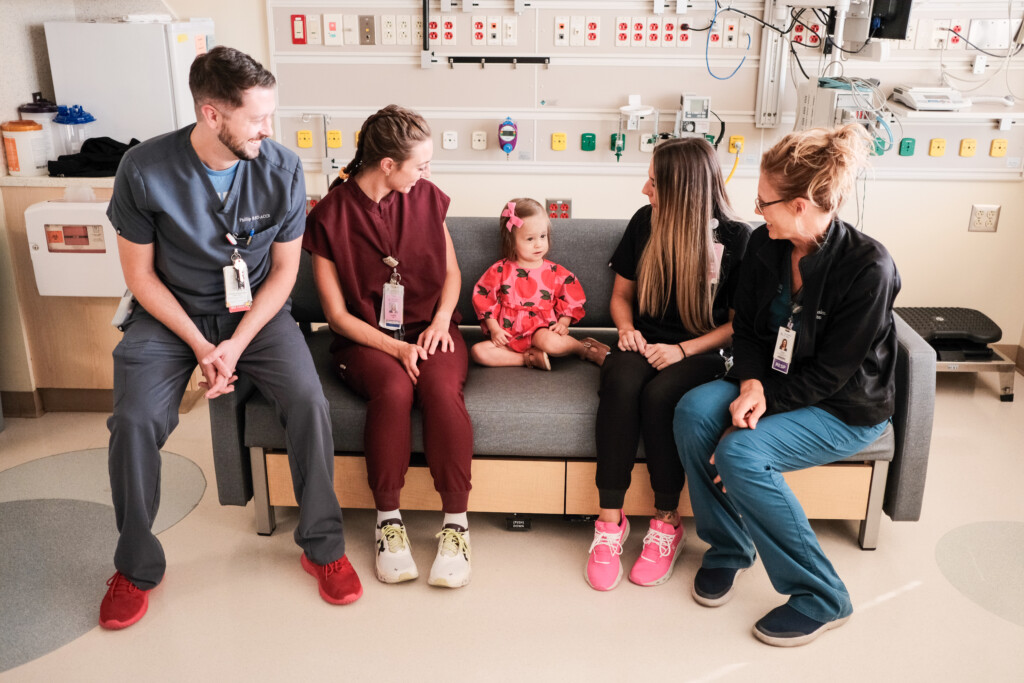A Highlight of Hope: November is National Prematurity Awareness Month

At only 23 weeks’ gestation, Hilliary Eslicker began having contractions. Alarmed, she and her husband, Scott, rushed to the emergency room. They never imagined that their successful IVF pregnancy would lead to the Neonatal Intensive Care Unit (NICU) at Ascension St. John Hospital. Four days after being admitted to the hospital in early labor, baby Greer was born and immediately intubated.
“I didn’t know if she was going to make it, and I just wanted to see her face,” Hilliary said through tears. “They brought her around so I could see her.”
Hilliary and Scott’s baby girl weighed 1 pound 4 ounces at birth and was only 11.75 inches long. They visited Greer that night and saw her for the first time in her glass enclosure, separating them from touch.
Like Greer, one in 10 babies in the United States is born before term. Preterm births are a leading cause of infant mortality. To raise awareness of this issue, November is designated National Prematurity Awareness month. It highlights the health issues arising from preterm births like the Eslickers experienced. It also highlights what can be done to prevent preterm births and new innovations to help preemies.
Hope and Potential Heartbreak
Ultimately, hope is at the root of this awareness. Teams of caretakers like the ones caring for Greer at Ascension St. John and in NICUs across the country are committed to saving lives. The NICU staff is charged with fighting to save preterm babies and very ill newborns, a career that is challenging, stressful and sometimes heartbreaking. The rewards are worth the stress when health professionals see babies in their care go home. Promising data show that the survival rate for a baby born at 28 weeks is 80 to 90 percent, with some data showing rates as high as 94 to 98 percent, with only 10 percent of babies born at 28 weeks having long-term complications.
“The first two weeks were wild and stressful, and I didn’t get to hold her for the first time until she was 41 days old,” Hilliary said. “I had so much guilt and was afraid to even touch her at first. I felt like it was all my fault.”
A Caring Team
Hilliary’s feelings are not uncommon to moms of preemies, according to research published by the NIH in England. Many women in the study experienced anxiety, fatigue, flashbacks and negative feelings in the early months after giving birth. A caring NICU staff, therefore, is crucial in helping ease the parents’ stress as they navigate the unexpected outcome of a premature birth and the unfamiliar environment of the neonatal unit.
During Greer’s entire stay in the NICU, the staff supported the Eslickers, giving them love, encouraging them and holding their hands during one of the most trying times in their lives.
Kennedy Raby, RN, was one of the nurses who cared for Greer. “I started taking care of Greer within her first week of life and took care of her all of her stay in the NICU,” she said. “I was there for many of baby’s milestones, through the good and the bad times.”
NICU staff work daily to set goals with the families and emphasize their committed presence. NICUs have evolved and developed significantly in the last decade to provide the most optimal and successful care to premature and ill babies, with increased staff training, technological advancements, improved language bridges, innovative family-centered care, and improvements in testing, ultimately increasing the survival rates for newborns.
Claire Cromie-Johnson, manager of external communications for Ascension St. John, is proud to work alongside the professionals who give so much of themselves to the care they provide.
“I really admire these people like Kennedy, staff, associates and nurses who do this because they are passionate about it and make such a difference in the world,” Claire said. “There is an extraordinary amount of work, time and talent that goes into making sure the families that come for care get that and have confidence in their care team.”

L to R) Kennedy Raby, NICU nurse, Greer Eslicker, and Kaylee Gorry, front desk worker, NICU nurse’s aide, who is in nursing school with plans to be a NICU nurse.
Life Outside of NICU
When it was time to take baby Greer off her ventilators to prepare for life outside the NICU, Scott and Hilliary were warned of the many possible challenges that could be ahead of them. “It was terrifying, but she never had to be intubated again,” Hilliary said. “The staff provided so much comfort and just wanted to love on and hug my baby. They were so there for her.”
One of the staff attributed Greer’s strong will to her survival. Today, Greer is a fun, tough and happy almost 2-year-old little girl, who keeps her mommy and daddy on their toes. Kennedy and other staff members from Ascension St. John NICU have kept in touch with the family. Kennedy sometimes babysits for them. “They shared all of those emotions with us in the most challenging times,” she said. “They waited for this little girl for so long, and now she’s just thriving.”
“It takes an incredible amount of courage to share such a personal journey, but the opportunity for hope is what makes all of our work so rewarding,” Claire said. “By sharing this story, it could give some modicum of comfort to others who may be going through the same thing, or who have experienced it firsthand.”
“We are just so thankful for everything they did for us,” Hilliary said. “It was scary, but when it was time to go home, it was honestly hard to leave them. We were there for 124 days, and I cried saying goodbye to our nurses. The staff there is just really special to me.”






